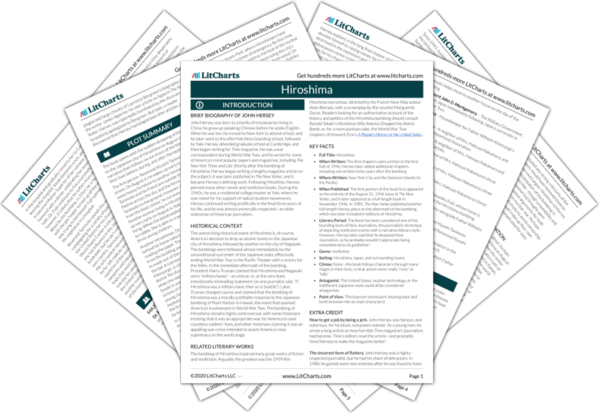Reverend Kiyoshi Tanimoto Quotes in Hiroshima
A hundred thousand people were killed by the atomic bomb, and these six were among the survivors. They still wonder why they lived when so many others died.

Unlock explanations and citation info for this and every other Hiroshima quote.
Plus so much more...
Get LitCharts A+All the way, he overtook dreadfully burned and lacerated people, and in his guilt he turned to right and left as he hurried and said to some of them, "Excuse me for having no burden like yours."
He experienced such horror at disturbing the dead—preventing them, he momentarily felt, from launching their craft and going on their ghostly way— that he said out loud, "Please forgive me for taking this boat. I must use it for others, who are alive."
The sounds came from one of the sandspits, and those in the punt could see, in the reflected light of the still-burning fires, a number of wounded people lying at the edge of the river, already partly covered by the flooding tide. Mr. Tanimoto wanted to help them, but the priests were afraid that Father Schiffer would die if they didn't hurry, and they urged their ferryman along.
When they came to know the war was ended—that is, Japan was defeated, they, of course, were deeply disappointed, but followed after their Emperor's commandment in calm spirit, making whole-hearted sacrifice for the everlasting peace of the world—and Japan started her new way.
Nor did he have any place in the Japanese peace movement, for he had been out of the country at crucial moments in its development and, besides, his Christian outlook made him suspicious of the radical groups that were on the cutting edge of antinuclear activity.
He was slowing down a bit. His memory, like the world's, was getting spotty.

Reverend Kiyoshi Tanimoto Quotes in Hiroshima
A hundred thousand people were killed by the atomic bomb, and these six were among the survivors. They still wonder why they lived when so many others died.

Unlock explanations and citation info for this and every other Hiroshima quote.
Plus so much more...
Get LitCharts A+All the way, he overtook dreadfully burned and lacerated people, and in his guilt he turned to right and left as he hurried and said to some of them, "Excuse me for having no burden like yours."
He experienced such horror at disturbing the dead—preventing them, he momentarily felt, from launching their craft and going on their ghostly way— that he said out loud, "Please forgive me for taking this boat. I must use it for others, who are alive."
The sounds came from one of the sandspits, and those in the punt could see, in the reflected light of the still-burning fires, a number of wounded people lying at the edge of the river, already partly covered by the flooding tide. Mr. Tanimoto wanted to help them, but the priests were afraid that Father Schiffer would die if they didn't hurry, and they urged their ferryman along.
When they came to know the war was ended—that is, Japan was defeated, they, of course, were deeply disappointed, but followed after their Emperor's commandment in calm spirit, making whole-hearted sacrifice for the everlasting peace of the world—and Japan started her new way.
Nor did he have any place in the Japanese peace movement, for he had been out of the country at crucial moments in its development and, besides, his Christian outlook made him suspicious of the radical groups that were on the cutting edge of antinuclear activity.
He was slowing down a bit. His memory, like the world's, was getting spotty.











